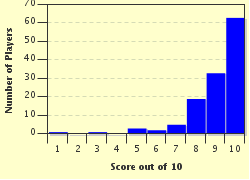Quiz Answer Key and Fun Facts
1. One of Ricky Martin's best known songs is "Livin' La Vida Loca". We already learned that "vida" is the Spanish word for "life". What kind of life does Ricky lead with his girlfriend as indicated by the word "loca", knowing that she is the kind of woman that makes him want to take his clothes off and go dancing in the rain?
2. One of Shakira's hits is called "Dia de Enero". "Dia" means "day". Shakira sings about the day she met her lover. She describes the month in which this happened by using the word "enero". Knowing that there is a lot of sun in the video and that Shakira lives in the Southern Hemisphere, which month is she describing?
3. Alejandro Sanz sings about "Corazon Partio". "Partio" means "broken" in English. What did Alejandro break, knowing that a woman is involved and he will require bandages, but not in the literal sense?
4. One of the hits of Enrique Iglesias is "Bailamos". In the song both Spanish and English are used, so Enrique tells his girl he will not leave her side and asks her to let the rhythm take over. What is Enrique inviting her to do with the word "bailamos"?
5. Juanes has a song called "A Dios le Pido". He wants to ask someone something (as indicated by "pido"). Knowing that Juanes asks for protection for his family and country from someone who would never leave him, who is Juanes directing his query to ("A Dios")?
6. Don Omar has a song called "Hasta Abajo". The word "hasta" can be translated as "until". In the context it is used in a less literal sense. As Don is dancing the night away with his girl and is obviously using very cool moves, what could be the direction Don could be going until?
7. Consuelo Velazquez wrote a song called "Besame Mucho". "Mucho" can be translated as "a lot". What would Consuelo like her boyfriend to do a lot so it will linger, now that she fears it would be their last time?
8. One of Gloria Estefan's hits is "Mi Tierra". "Mi" means "my" in English. Knowing that Gloria is singing about her Cuban roots, what could be the meaning of "tierra"?
9. One of the biggest hits for Mecano is "Hijo de la Luna". "Hijo" can be translated as either "son" or "child". What is the meaning of "luna", when you know that a gypsy woman in the song asks to wait until sunrise to find a suitable man?
10. Paulina Rubio has a song called "El Ultimo Adios". "Adios" means "goodbye". Knowing that Paulina feels like days without her lover's nights are like daggers to her cold heart, what could be the meaning of "ultimo"?
Source: Author
James25
This quiz was reviewed by FunTrivia editor
stedman before going online.
Any errors found in FunTrivia content are routinely corrected through our feedback system.

